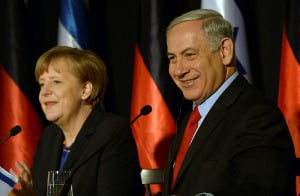The Dutch join Germany in rejecting unilateral recognition of a “Palestinian” state. Does this announcement from Holland signal a shift in European policy?
Holland’s new Foreign Minister Bert Koenders declared last week that for now the Netherlands will not recognize a “Palestinian” state. According to Koenders, recognition is not conducive to advancing stalled peace talks, JTA reports, citing a recently released transcript of the speech.
“We believe this is not an advisable measure,” Koenders told a Dutch Parliament session last Wednesday during the annual debate on his office’s budget and policy.
“We find that it is not correct to recognize the Palestinian state. It must be a part of negotiations. In that sense, it should be introduced at a strategic moment,” he said.
Despite the fact that a growing number of European nations’ parliaments and governments, including Sweden, Britain and Spain, are in the process of recognizing “Palestine,” Koenders stated that “the overwhelming majority, including the Dutch government, believes that it does not contribute to the priority issue of restarting negotiations, if we all of a sudden go ahead [and recognize a state] because Sweden also did it.”
Palestinian Division Hinders Peace
Koenders further added that attempts to restart peace talks between Israel and the Palestinian Authority are complicated by the Palestinians’ being “more divided than ever before, which makes negotiations very difficult,” and by Israeli construction beyond its so-called 1967 borders and in Jerusalem, which has been criticized by the European Union.
Prime Minister Benjamin Netanyahu previously responded to the EU claims regarding Israel’s construction in its capital by stating:
“I don’t understand this criticism, and I don’t accept this position. Arabs in Jerusalem freely buy apartments, and nobody says that is forbidden. I will also not say that Jews cannot buy property in Jerusalem. There cannot be discrimination between Jews and Arabs. This is a normal process, and I see no reason to discriminate.”
A Shift in European Policy?

Prime Minister Netanyahu holds a joint press conference with German Chancellor Merkel in Jerusalem. (Photo: Haim Zach/GPO)
Dutch policy runs along the same lines as the approach adopted by Germany.
Speaking at a press conference on Friday, German Chancellor Angela Merkel expressed opposition to the unilateral recognition of a “Palestinian” state. She told the press conference that such an action “would not move us forward on the way to a two-state solution,” which Germany supports. According to Merkel, negotiations between the two sides is the only path to a solution, despite her awareness that this approach may be very difficult currently.
To date, the European Union has not voted on recognizing a non-existent “Palestinian” state. Since the 28 EU member states need to decide unanimously on recognition of statehood, Merkel’s objection amounts to a veto on the subject.
You Can Help Israel and Jerusalem
Israel’s sovereignty in Jerusalem, its capital, has come under increased attack in past weeks. Supporters need to stand together and show the world that Jerusalem is not a bargaining chip in border negotiations or a convenient yet meaningless rallying point for terrorists. Jerusalem is a Holy City that provides a beacon of light to all nations under the sovereignty of Israel.
Help us to ensure that Jerusalem stays unified. Click HERE to sign The Jerusalem Declaration.
Author: United with Israel Staff
Do You Love Israel? Make a Donation - Show Your Support!
Donate to vital charities that help protect Israeli citizens and inspire millions around the world to support Israel too!
Now more than ever, Israel needs your help to fight and win the war -- including on the battlefield of public opinion.
Antisemitism, anti-Israel bias and boycotts are out of control. Israel's enemies are inciting terror and violence against innocent Israelis and Jews around the world. Help us fight back!























